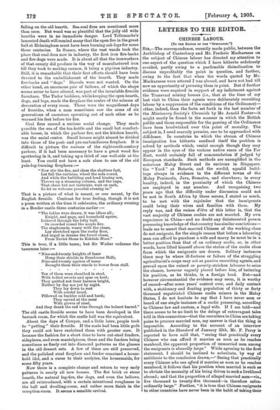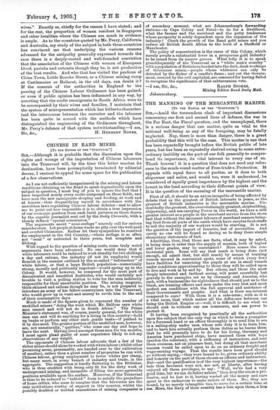[To THZ EDITQR 07 Till " SPXOTATOR:]
813,—The correspondence, recently made public, between the Archbishop of Canterbury and Mr. Frederic Macke:mess on the subject of Chinese labour has directed my attention to one aspect of the question which I have hitherto sedulously avoided, partly owing to a pardonable disinclination to discuss unprofitably the point in question, and further, owing to the fact that when the words quoted by. Mr. Mackarness were uttered I was abroad, and have not had till now an opportunity of perusing them in print. But if further evidence were required in support of my indictment against the Transvaal mining houses (i.e., that at the time of my last visit to China their agents were deliberately recruiting labour by a suppression of the conditions of the Ordinance)— other, indeed, than the facts set forth in the last number of the Missionary Society's Chronicle by Mr. Arnold Foster—it might surely be found in the manner in which the British public and those responsible for the passing of the Ordinance have been hoodwinked over this point of morality. The subject is, I need scarcely premise, one to be approached with diffidence. In countries to which the stream of Chinese immigration has hitherto confined itself the problem is solved by methods which, venial enough though they may appear in the eyes of the various native races of the Far East, would certainly fail of commendation if judged by European standards. Such methods are exemplified in the notorious Malay Street and its environs in Singapore, the " Yard " at Batavia, and the sordid, squalid build- ings always in evidence in the different towns of the Malay Peninsula, Java, Sumatra, and elsewhere ; in every locality, indeed, in the proximity of which the Chinese are employed in any number. And recognising two years ago that the difficulty under discussion could not be met in South Africa by these means, I stated as much, to be met with the rejoinder that the immigrants could bring their wives and families with them. My reply was, and the raison d'être of this letter is, that the vast majority of Chinese coolies are not married. My own experience in China—and no doubt any disinterested person possessing knowledge of that country has similar convictions— leads me to assert that married Chinese of the working class do not emigrate, for the simple reason that before a labouring man can afford to purchase a wife and marry he must be in a better position than that of an ordinary coolie, or, in other words, have lifted himself above the status of the coolie class from which the emigrants are drawn. Solitary instances there may be where ill-fortune or failure of the struggling agriculturist's crops may act as passive recruiting agents, and prevail upon the ruined or poverty-stricken labourer to seize the chance, however vaguely placed before him, of bettering his position, as he thinks, in a foreign land. But—and however circumstantial the evidence may seem, it is worthy of record—after some years' control over•, and daily contact with, a. stationary and floating population of thirty or forty thousand expatriated Chinese coolie miners in the Malay States, I do not hesitate to say that I have never seen or heard of one single instance of a coolie possessing, according to Chinese law and custom, a legal wife. If I am told—and there seems to be no limit to the deluge of extravagant tales told in this connection—that the recruiters in China are taking pains to procure married men, my answer is that the thing is impossible. According to the account of an interview published in the Standard of January 25th, Mr. F. Perry is reported to have said that, " seeing that practically every Chinese who can afford it marries as soon as he reaches manhood, the apparent proportion of unmarried men among the emigrants is absurdly large." While agreeing to the first statement, I should be inclined to substitute, by way of antithesis to the conclusion drawn,—" Seeing that practically every Chinese who can afford it marries as soon as he reaches manhood, it follows that his position when married is such as to obviate the necessity of his being driven to seek a livelihood abroad ; and that the proportion of alleged married men—viz., five thousand to twenty-five thousand—is therefore extra- ordinarily large." Further, " it is true that Chinese emigrants to other countries have never been in the habit of taking their wives." Exactly so, chiefly for the reason I have stated; and for the rest, the proportion of women resident in Singapore and other localities where the Chinese are much in evidence is ample. As to the countries quoted by Mr. Perry, California and Australia, my study of the subject in both these countries has convinced me that underlying the various reasons advanced for the antipathy generally expressed towards the race there is a deeply-rooted and well-founded conviction that the association of the Chinese with women of European blood, pariahs and outcasts though they be, is not productive of the best results. And who that has visited the purlieus of China Town; Little Bourke Street, or a Chinese mining camp at Castlemaine or Ballarat, in the old days, can doubt it? If the consent of the authorities in England to the passing of the Chinese Labour Ordinance has been gained, or even if public opinion has been influenced in any way, by asserting that the coolie eminigrants to South Africa were to be accompanied by their wives and families, I maintain that the system of misrepresentation which has hitherto character- ised the intercourse between the recruiter and the labourer has been quite in accord with the methods which have distinguished the engineering of the Ordinance throughout, Mr. Perry's defence of that system notwithstanding.—I am,
Sir, &c., H. HERBERT NOYES.











































 Previous page
Previous page